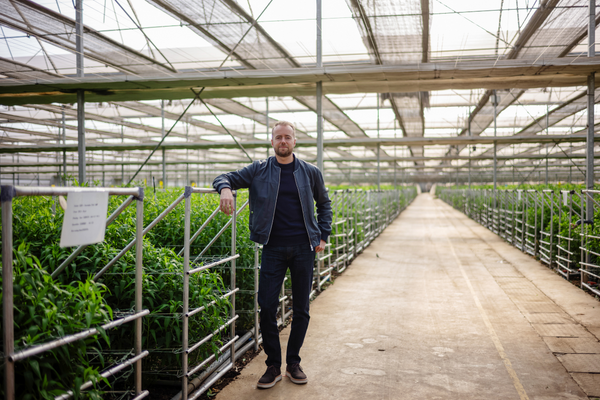Hasfarm is a leading international flower producer, bringing a wide range of quality flowers to the Asian market. In a recent conversation with FloralDaily, Tim Scalongne, Managing Director of Hasfarm (China), shared with us some flower information about the Asian market.
"Hasfarm has production bases in China, Vietnam, and Indonesia. Young plants and fresh-cut flowers are our main pillars. We cooperate with breeders in Europe to provide young plant services to markets in Europe and Asia. The fresh-cut flower business is our focus in the Asian market. Carnations, roses, tulips, alstroemerias, and chrysanthemums are the main types of fresh-cut flowers we sell in the Chinese market," introduces Tim.

He continues: "The market for fresh-cut roses is very large in China. I have been in China for 15 years. In the past 15 years, the quality of roses has improved a lot, and the standards are being unified, but there is still room for improvement in post-harvest processing. At the same time, more and more high-standard greenhouses have been built in the market for rose planting, and more and more professional groups have joined, all of which have continued to improve the quality of roses."
"We are planting in Kunming, Yunnan, China. The low-latitude and high-altitude location create very pleasant natural conditions, which are very suitable for the growth of roses. Excellent climatic conditions, good planting facilities, environmental control systems, and professional personnel of which have contributed to the high quality of our roses. China's transportation network is very developed, which can quickly transport fresh-cut flowers from Kunming to other major cities. Through cooperation with major high-quality retailers/wholesalers, our high-quality fresh-cut flowers are sent to first-tier cities such as Shanghai, Beijing, and Guangzhou," says Tim.
"At present, carnations are better in the Japanese market than in China, and their prices are higher. Pink and red carnations are very popular, and the prices in China are relatively cheap. However, due to the impact of the pandemic, flight logistics are unstable, and freight prices have risen sharply, which also has a certain impact on the export business," Tim continues: "As far as chrysanthemums are concerned, we choose to grow them in Vietnam and then import them into China. The climate conditions in Vietnam are more suitable for the growth of chrysanthemums, and the quality of the planting is better. In the growing process, we minimize the use of harmful chemicals, which is not only environmentally friendly but also important to the health of flower shoppers. We attach great importance to the protection of the environment and consumer health."
Flower consumption in China also continues to grow. In the early years, the main group of flower consumption was the government and businesses, which was mainly used for decoration, but now household consumption has become more and more important. The increase in people's income, the improvement of living conditions, and the growing up of new generations of consumer groups have all made flower consumption more daily-based. Tim concludes: "Chinese consumers are adventurous, which is very different from the Dutch. Dutch consumers will buy fixed categories at a fixed time point, while Chinese consumers are very willing to try new products on the market, especially when this new product is rare in the market and sales are very good. But Chinese consumer preferences also change rapidly, which means a new product has a very short life cycle. E-commerce platforms play an important role in China, as people tend to shop more and more online, as does flower consumption. But we think offline florists are also important because consumers can get more knowledge and better face-to-face help from florists. "
Finally: "Land use is another big challenge we are facing right now. With the implementation of the new land management law, it is now almost impossible to find land in Yunnan allowed to build greenhouses. But luckily, we can find enough workforce, especially during the pandemic. Many are choosing to work near their hometowns instead of going out of the hometown. We are not breeding ourselves, but we are very supportive of the breeders for variety protection. Only in this way can the market develop and grow, and it is beneficial to everyone." Illegal propagation remains a very big issue in China, and as foreign breeders can't travel to China now, we see an increase in illegal propagation.
 For more information:
For more information:
Hasfarm Horticulture
Tim Scalongne
Email: Tim.Scalongne@kunminghasfarm.com
https://hasfarmholdings.com/
